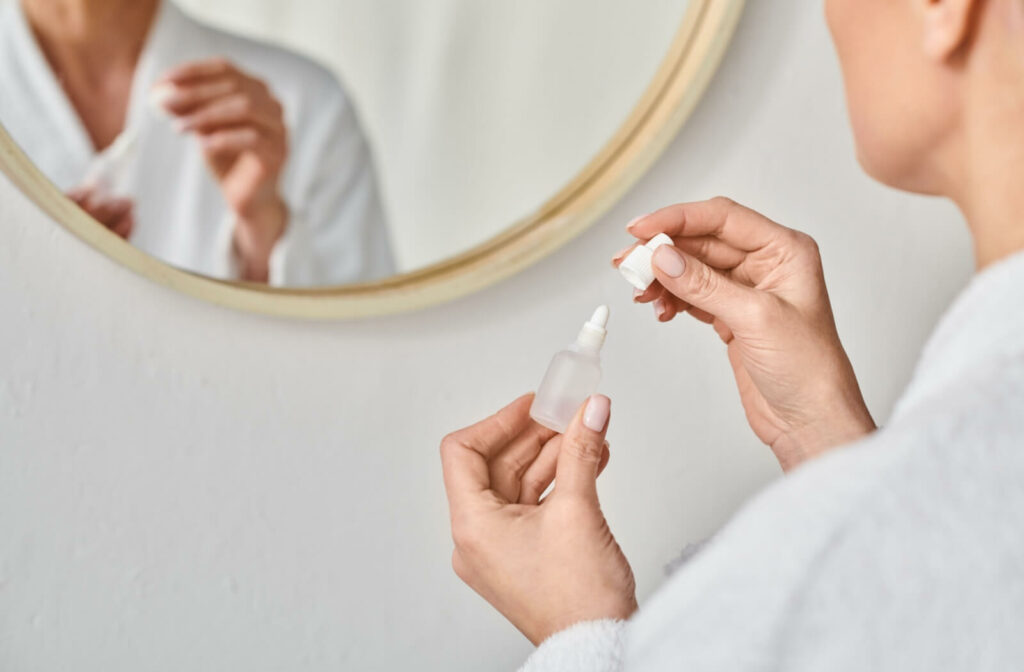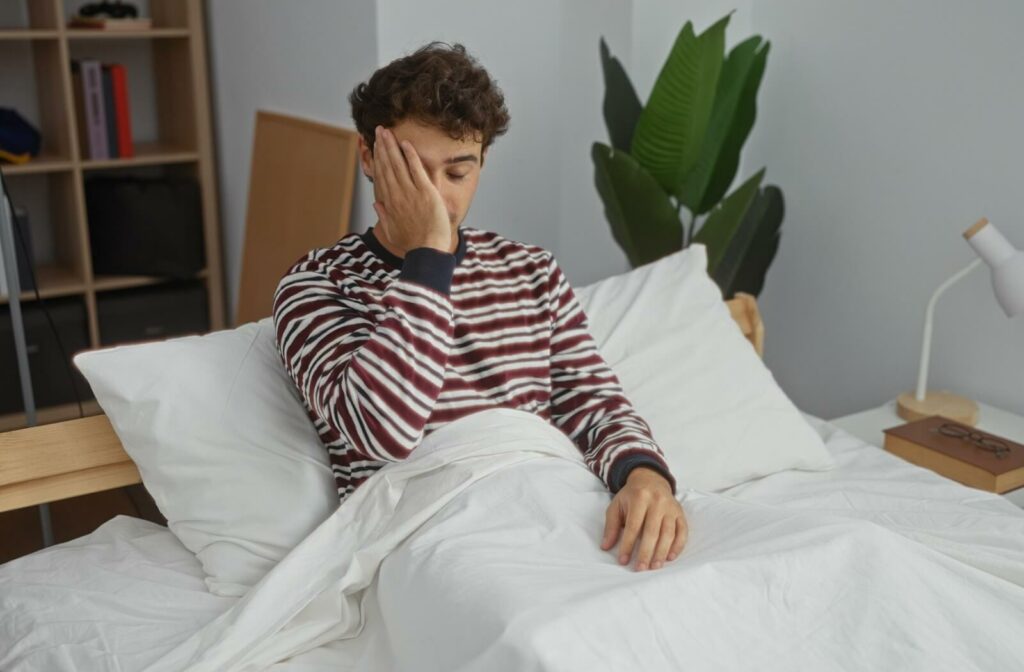Have you ever woken up to dry, irritated eyes? You’re not alone. Dry eye is a condition that millions of Canadians experience every day. Dry eyes in the morning can be caused by a variety of factors including:
- Dry air or direct airflow on the eyes.
- Allergens like dust and pollen in the air.
- Sleep disorders or the eyes not closing all the way while sleeping.
- Health conditions or medications affecting tear production.
- Lifestyle factors like excessive screen time, dehydration, overusing contact lenses, or wearing makeup to bed.
Luckily, waking up to dry eyes doesn’t have to be an everyday reality. Many simple lifestyle changes can help keep your eyes moist at night. And even if none of these help, there are professional treatments available to help give you dry eye relief.
What Is Dry Eye?
Dry eye is a condition in which the eyes do not produce enough tears or the tears evaporate too quickly. This leaves the surface of the eye exposed, leading to discomfort and potential complications if left untreated.
Common symptoms of dry eye include:
- Irritation
- Redness of the eyes
- Watering
- A gritty or burning feeling in the eye
- Eye strain and fluctuating vision
- Light sensitivity
Sometimes, your eyes dry out due to environmental factors like poor air quality, or excessive screen time. However, if your eyes are consistently dry there is a need to find the underlying cause.
Common Causes of Dry Eyes in the Morning
Several factors can contribute to waking up with dry eyes, each varying based on individual circumstances. Here are the most frequent causes of morning dry eyes:
Environmental Factors
- A lack of humidity in your sleeping space can reduce moisture retention, leading to your eyes drying out.
- Direct exposure to fans or air conditioning can evaporate the tear film, intensifying dryness.
- Environmental allergens such as dust, pollen, or pet dander trigger inflammation, worsening dryness.
Sleep-Related Issues
- When eyelids don’t fully close during sleep, the cornea becomes exposed, resulting in dryness and an increased risk of irritation.
- Sleep disorders like sleep apnea can lower oxygen levels in the blood and strain overall eye health. An improperly fitting CPAP mask may also contribute to dryness, as well as fatigue from disrupted sleep.
- Health Conditions
- Certain medications can lead to reduced tear production. Speak to your healthcare provider about whether medications you are taking might be causing this issue.
- Chronic conditions like blepharitis or Sjögren’s syndrome can severely limit moisture production in the eyes.
Lifestyle Factors
- Prolonged screen use, especially before bed, can cause increased dryness. Applying the 20-20-20 rule can help alleviate or prevent strain.
- Extended wear of contact lenses, especially overnight, reduces oxygen supply to the eyes, worsening dryness.
- Insufficient fluid intake during the day depletes tear production. Staying hydrated supports both overall and ocular health.
- Sleeping with eye makeup can irritate your eyes and increase the risk of infection, leading to redness and dryness.
Solutions for Morning Dry Eyes

Luckily, there are a variety of at-home and in-office solutions for morning dry eye. Here are some dry eye treatments you might want to consider:
At-Home Remedies
Adopting simple remedies can alleviate mild symptoms of dry eyes in the morning.
- Avoid screens before bed. Avoiding screens an hour before bed can enhance sleep quality and reduce eye strain and dry eyes.
- Using a humidifier to maintain humidity in your bedroom helps prevent evaporation from the eye’s tear surface.
- Preservative-free artificial tears can lubricate your eyes in the morning and throughout the day, while ophthalmic ointments provide longer-lasting hydration for more severe dryness overnight
- Warm compresses can improve tear production and retention.
- Sleep masks or moisture chamber goggles help keep your eyes closed during sleep, protecting them from environmental factors.
- Stay hydrated and try to drink at least 8 glasses of water every day.
- Try swapping out contact lenses for glasses to let your eyes “breathe”, especially right before bed.
Advanced Treatments for Persistent Dry Eye
If at-home remedies fail, it might be time to consider professional treatments for relief. Many optometrists offer customizable dry eye therapies to help you overcome dry eyes. Common in-office dry eye treatments include:
- Intense Pulsed Light (IPL) therapy: IPL uses broad-spectrum light to target inflammation and improve tear quality, providing lasting relief for chronic dry eye sufferers.
- Radiofrequency (RF) therapy: RF therapy stimulates the glands in your eyelids, promoting normal oil production for higher-quality tears and alleviating dryness.
- Customized treatment plans: Optometrists may recommend a combination of treatments like IPL, RF, eyelid cleanings, and prescription artificial tears to help combat your dry eyes.
Get Dry Eye Relief Today
Don’t let dry eye symptoms disrupt your morning routine. By trying out at-home solutions and consulting your optometrist for professional help, you can find comfort from dry eye symptoms.
At Waterloo Vision Care Clinic, we offer comprehensive dry eye treatment services to get you closer to dry eye relief. Book a consultation at our dry eye clinic today to find your dry eye solution!




